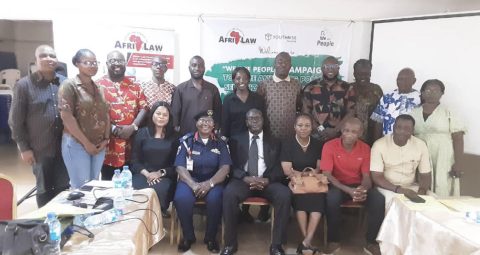Torture Of Drug Users By Nigerian Law Enforcement Agents Still Alarming, Says AFRILAW Survey
Articles/Opinion, Featured, Latest Headlines Sunday, July 7th, 2024
(AFRICAN EXAMINER) – Despite being signatory to several international laws and Regional instruments prohibiting torture and other forms of ill-treatment against drug users, such cruel act by law enforcement agents is still alarming in Nigeria, report of a survey by African Law Foundation, (AFRILAW), a non governmental law, Justice and development organization has revealed.
The finding, which presents evidence on the physical and mental violence faced by drug users in parts of the country, was contained in a twenty page survey report carried out by the organization in five states of Nigeria, which included Abia, Abuja, Akwa Ibom, Enugu and Kaduna.
Speaking during a one day Torture and Drug policy sensitization workshop to disseminate the document in Enugu weekend, and part of activities to mark this year’s world drug day, Executive Director of AFRILAW, Barrister Chinwike Okereke, disclosed that the information included in the report was collected through a mixed methods approach that includes desk research and a survey of 79 people who uses drugs and other Stakeholders in the aforementioned states.
Our correspondent writes that the exercise was put together by AFRILAW in conjunction with the Youth Arise Nigeria and ‘We are People’ Campaign.
He stated that the evidences gathered revealed that people who use drugs in Nigeria are routinely subjected to physical, mental and sexual violence in the hands of law enforcement agents.
According to the report, some of the respondents accused members of the specialized drugs organization such as the National Drug Law Enforcement Agency NDLEA, as well as Police Personnel and Staffers of the Nigerian Correctional facility of perpetrating the maltreatment against the drug users.
The report noted that Nigeria has entered into a number of international instruments that prohibits torture, including the International Convention on Civil and Political Rights, the UN convention against Torture, and the African Charter on human and people’s Rights, yet such ill -treatment has remined on the increase in the country.
It pointed out that the Administration of criminal Justice Act ACJA, passed in 2015, prohibits torture and cruel, inhuman or degrading treatment of arrestees, including people detained for drug offences, or people detained by the NDLEA.
“In 2017, Nigeria enacted the Anti torture Act 2017, which criminalizes torture and prescribes offences and penalties for any person who commits torture, aids, counsels, or procures any person to commit torture.”
The research findings further revealed that there is violence in government drug rehabilitation centres and abuses in religious centres, stressing that lack of accountability and redress are militating against the fight on violence in drug use.
. “Drug treatment services in Nigeria are mainly based in tertiary hospitals, whereas some Non-Governmental Organisation (NGO) offer limited services”, the findings stated.
Against the backdrop of the said challenges, AfriLaw recommended, among others, that there should be cross-cutting recommendation on civil society and community involvement to ensure that drugs users are meaningfully involved in all aspects of the design, delivery and monitoring of health intervention offered to such people, including peer-led harm reduction, treatment, and rehabilitation services.
The research also recommended legislative measures to decriminalize drug use and possession for personal use to reduce interaction between people who use drugs and the police; ensure access to alternatives to incarceration for people convicted for drug offenses: and conduct public awareness campaigns to reduce stigma and discrimination against people who use drugs.
Also, the organization advocates for a “national legislation to provide a sound regulatory framework and minimum quality standards for drug treatment institutions, including guarantees for effective legal safeguards for all persons interned therein.
“Ensure that treatment provided in such centres is always voluntary, evidence-based, and in compliance with international standards.
Some of the key stakeholders drawn from various Security outfits such as the NDLEA, Police, Nigeria Security and Civil Defence Corp NSCDC, Nigeria Correctional Service, representatives of drug users Community, amongst others, had in their separate remarks commended AFRILAW in its intervention, urging it to keep up with the good work in the country.
Related Posts
Short URL: https://www.africanexaminer.com/?p=96731






















